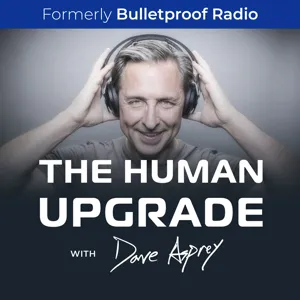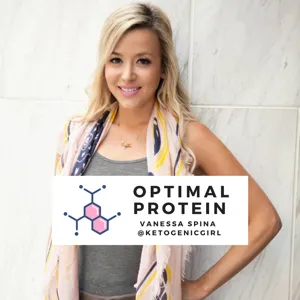Podcast Summary
Emphasizing a healthier and happier aging process: Focus on hormone, gut, and mental health, explore scientific advancements, and maintain a positive mindset for a vital and purposeful aging experience.
While there is fear and negativity surrounding aging, we should focus on living healthier and happier lives as we age, rather than just living longer. Gabriella Peacock, a nutritional therapist, emphasizes the importance of prioritizing hormone health, gut health, mental health practices, and investigating various scientific advancements. Our mindset towards aging is crucial, and small changes in our diet and lifestyle can significantly impact the way we age, even more so than genetics. We should aim for a life full of vitality and purpose, and not just add years to our lives, but also make those years meaningful and enjoyable. The prediction of an aging population by 2050 emphasizes the need for us to invest in our health and well-being today.
Embrace aging with knowledge and intentionality: Focus on positive changes, inside and out, to age well, challenge negative attitudes towards aging, and understand the complex biological markers of aging to make informed choices.
Aging is not something to be feared or avoided, but rather embraced and approached with knowledge and intentionality. Both the outside and inside aspects of aging are interconnected, and focusing on positive changes, no matter how small, can lead to significant overall improvements. The conversation around aging often centers on appearance, but it's essential to pay attention to aging on the inside as well. The language we use, such as "anti-aging," can perpetuate negative attitudes towards aging. Instead, we should focus on "proaging" or aging well. The fear of aging is deeply ingrained in society, but with longer lifespans and advancements in science and medicine, it's crucial to feel fantastic as we age. The biological markers of aging are complex, with nine different hallmarks identified, but understanding them can help us make informed choices to support our health and wellbeing as we age.
Understanding the complex process of aging through telomeres and cellular senescence: Telomere length and cellular senescence are important markers of aging, and understanding these processes can help us influence how we age. Our lifestyle choices can impact these markers, even if we have a genetic predisposition to aging.
Aging is a complex process that can be influenced by both genetics and lifestyle. While scientific understanding of aging is advancing, the information can be hard to decipher for non-experts. Two key concepts are telomeres and cellular senescence. Telomeres, the protective caps at the end of chromosomes, shorten as cells divide, and their length can predict biological age. Cellular senescence refers to the dying off of cells, which can become less efficient and create "zombie cells" that cause harm while they slowly die. Both telomere length and cellular senescence are important markers of aging, and understanding these processes can help us influence how we age. Even if we have a genetic predisposition to aging, epigenetics shows that we have the power to make changes through our diet and lifestyle.
Maintaining mitochondrial health for longevity: Support mitochondrial function and longevity by consuming a balanced diet rich in essential nutrients, including sulfur-containing foods for methylation and NAD+ boosting foods for energy production.
Maintaining the health and function of mitochondria, the powerhouse of cells that produce energy, is crucial for longevity. The substance NAD+, which acts as fuel for mitochondria, is essential for life and helps regulate body functions, including DNA repair. As we age, our NAD+ levels deplete, leading to research into NAD supplementation. Methylation, another important process, is linked to mitochondrial health and can be supported through consumption of sulfur-rich foods like broccoli and kale. While some foods, like kale, contain oxalic acid, which can reduce mineral absorption, the benefits of these nutrient-dense foods generally outweigh the potential drawbacks when consumed in moderation. Overall, focusing on a balanced diet rich in essential nutrients, including sulfur-containing foods, can support both mitochondrial health and methylation processes.
Aging and Intracellular Communication Breakdown: Maintain a balanced diet, reduce environmental toxins, and prioritize liver health to manage chronic inflammation and altered intracellular communication, which can lead to chronic diseases.
As we age, our bodies' communication networks can break down, leading to altered intracellular communication and inflammation. Chronic inflammation contributes to most chronic diseases and can be influenced by both internal (diet, lifestyle) and external (pollution, UV light, pesticides) factors. To support the body in managing these factors, it's essential to maintain a balanced diet, reduce exposure to environmental toxins as much as possible, and prioritize liver health. While the term "toxins" can be controversial, it's important to recognize that negative substances do exist in our environment and diet. One potential issue to watch out for is mycotoxins, which can be found in foods like nuts, seeds, and coffee. If you suspect mycotoxins may be an issue for a client, focus on supporting liver function and reducing overall toxin exposure. By simplifying your approach and focusing on the basics, you can effectively address altered intracellular communication and promote overall health.
Supporting Liver Health: A Multi-Faceted Approach: Eat nutrient-dense foods like broccoli, green veggies, spirulina, wheat grass, and take supplements of vitamin C, alpha lipoic acid, n-acetylcysteine, L-methionine, cysteine, and a good multivitamin. Consider glutathione for extra support.
Supporting liver health involves a multi-faceted approach. From a practitioner's perspective, it's essential to consider lifestyle factors, such as diet, while also supporting liver function through supplementation. Nutrient-dense foods like broccoli, green vegetables, spirulina, and wheat grass are key, as well as specific supplements like vitamin C, alpha lipoic acid, n-acetylcysteine, L-methionine, and cysteine. A good quality multivitamin is also a must, as deficiencies are common. Glutathione, a powerful antioxidant within the body, is another crucial nutrient for liver health. The liver's ability to detoxify is remarkable, but it can be challenged by toxins and chemicals. By focusing on liver-supporting foods and supplements, we can give our bodies the best chance to function optimally.
The benefits of controlled stress: Embracing short, controlled stress can make our bodies more resilient and contribute to longevity. Mindfulness practices, regular physical activity, and social connections can help manage stress effectively.
While some individuals may benefit from supplementing glutathione due to a genetic predisposition, it can be a tricky nutrient to observe its effects due to individual differences in gene expression. However, a more universally applicable takeaway is the potential benefits of controlled stress. Contrary to popular belief, stress in short and controlled periods can make our bodies more resilient to external stressors and contribute to longevity. This is because our bodies respond to stress by strengthening various systems, making us better equipped to handle future challenges. It's important to note that the type of stress matters – chronic stress is harmful, while acute stress can be beneficial. So, embracing a balanced approach to stress, with strategies like mindfulness practices, regular physical activity, and social connections, can lead to improved overall well-being.
Spring cleaning for cells: Autophagy: Controlled stress through fasting or temperature changes can trigger autophagy, a cellular process that eliminates malfunctioning proteins and releases energy, leading to cleaner and more energetic cells. Regular intermittent fasting can be beneficial.
Controlled stress, such as fasting or hot and cold therapy, can trigger a process called autophagy, which is like your body's spring cleaning of cells. Autophagy helps get rid of malfunctioning proteins and releases energy, resulting in cleaner and more energetic cells. While a 5-day fast can be an effective way to initiate autophagy, intermittent fasting with a restricted eating window can also be beneficial. The key is balance, and even small efforts can lead to positive results. It's important to note that autophagy can be challenging to measure, and the length of time required to initiate the process may depend on individual health status.
Enhancing Autophagy through Fasting and Other Methods: Fasting and limiting food intake can enhance autophagy, a process that breaks down and recycles old cells, leading to increased energy, improved brain function, and elimination of damaged cells. Start small and gradually build up to longer fasting periods for optimal benefits.
Autophagy, a process in the body that breaks down and recycles old cells, can be enhanced through various methods such as intermittent fasting and limiting food intake for extended periods. However, the length of time it takes for autophagy to kick in can vary greatly depending on individual factors like weight, inflammation levels, and lifestyle. Fasting doesn't have to be daunting or negative; instead, it can be seen as limiting your eating window and giving your body a chance to rest and repair. The benefits of autophagy include increased energy, improved brain function, and the elimination of damaged cells. Additionally, incorporating practices like cold showers, which are easy, accessible, and free, can also contribute to overall health and longevity. The key is to start small and gradually build up to longer fasting periods, allowing the body to adjust and reap the full benefits.
Exposing yourself to various stressors for longevity: Incorporating stressors like cold showers, saunas, and bitter plants can boost autophagy, promote effective protein folding, and increase production of beneficial phytochemicals for longevity.
Exposing ourselves to various stressors, such as cold showers, saunas, and steam rooms, can support autophagy and contribute to longevity. These stressors trigger protective responses in the body, leading to effective protein folding and the production of beneficial phytochemicals in plants. Easy rules to follow include eating colorful, bitter, and deeply pigmented plants, as they contain higher concentrations of these protective compounds. Practices like drinking apple cider vinegar before meals, using herbs to manage blood sugar levels, consuming green tea or matcha, and using MCT oil during fasting can also support overall health and well-being.
Adding MCT oil to diet during intermittent fasting or late morning meals: MCT oil can help curb hunger, improve cognitive function, and enhance coffee's positive effects on cognitive function and autophagy.
MCT oil can be a useful addition to a person's diet, particularly when practicing intermittent fasting or for those who don't eat until late in the morning. MCT oil can help curb hunger and improve cognitive function. Regarding coffee, it can also be beneficial when consumed with MCT oil and soluble fiber, as there is a lot of research linking it to positive effects on cognitive function and autophagy. Overall, incorporating these elements into one's routine can support overall health and well-being. For more in-depth information on intermittent fasting, autophagy, and coffee's benefits, check out previous episodes featuring Dr. Francoise Wilhelmi de Toledo. For those interested in subscribing to ad-free episodes and early access, visit Apple Podcasts. Don't forget to explore lisellewellbeing.co.uk for more longevity tips and delicious recipes.





